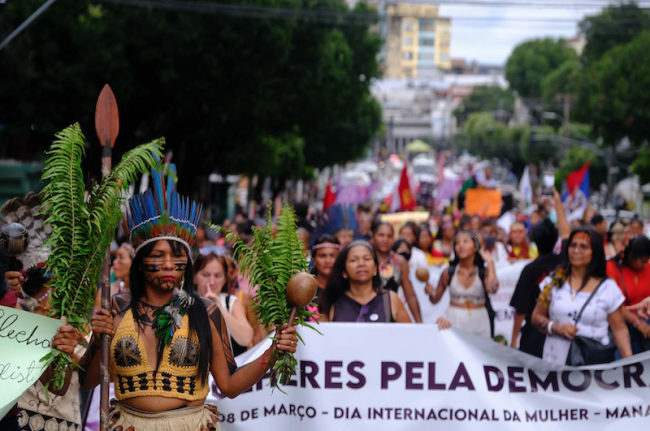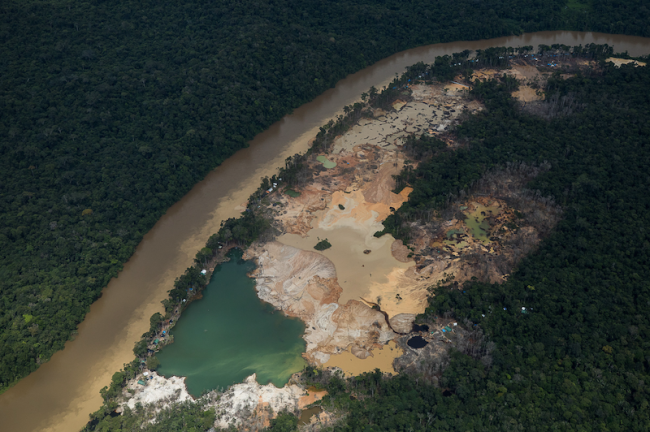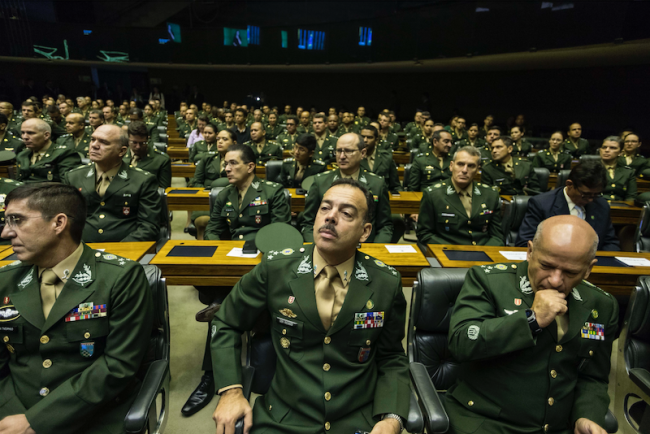
This piece appeared in the Summer 2023 issue of NACLA's quarterly print magazine, the NACLA Report. Subscribe in print today!
Leer este artículo en español.
On December 25, 2022, Brazil’s Federal District police detained a suspect for trying to blow up a tanker truck full of gasoline near the parking lot of the Brasília International Airport. The man, together with several hundred people, had been camping in front of the Brazilian Army headquarters for days, clamoring for the military to carry out a coup. Their goal was to cause chaos, which, according to the theories circulating among right-wing groups on Telegram, would allow then-President Jair Bolsonaro to declare a state of siege, definitively hand over civil power to the military, and annul the result of the October 2022 presidential elections, in which the leftist Luiz Inácio Lula da Silva had triumphed by a small margin.
The quasi-terrorist planned to endanger the lives of thousands of people—the capital’s airport receives more than 35,000 people a day—because he did not recognize the election results and refused to accept Bolsonaro’s departure, especially if it meant passing power to former president Lula. Upon his arrest, a large arsenal of weapons and ammunition was found in the suspect’s possession.
According to the police, the detainee was from the state of Pará and introduced himself as a “gas station manager.” But subsequent investigative reports stated that he was probably a secret partner in a gas station network and transport company operating in several Amazonian states, more specifically in the region known as “the arc of deforestation.” The transport company he appeared to be linked to had already had a truck confiscated by the Federal Highway Police for transporting illegal timber. And many of the gas stations in the network in question are in cities known for high rates of violence related to the illegal grabbing of public lands and with garimpo, as illegal mining is known in Brazil.
There is enormous overlap between Bolsonarismo—the far-right movement that gave political support to the Bolsonaro government—and environmental crime in Brazil, especially in the Amazon. Many of those who participated in the violent takeover of the capital in an attempted coup on January 8, 2023 reported that they traveled to Brasília with all expenses paid by “businessmen” in places such as Rondônia, Mato Grosso, and Pará, Amazonian states where much deforestation and the expansion of illegal mining are concentrated. It is already quite clear that the fight against environmental crime is also a fight for democracy in the country, because the agents of chaos are the same. Those who bet against democracy did so because they are heavily invested in an illegal economy—or an economy benefiting from impunity—that fuels deforestation. They knew that the best chance at staying in business without major setbacks was to keep Bolsonarismo in power at any cost.

For example, among the fervent “patriots,” as right-wing extremists call themselves, is a businessman with financial interests in illegal mining in Roraima. Rodrigo Martins de Mello, also known as Rodrigo Cataratas, has faced criminal investigations for his alleged responsibility for financing the illegal extraction of minerals such as gold in the Yanomami Indigenous Territory. During the four years of Bolsonaro’s government, more than 20,000 wildcat miners, working in conditions akin to slavery, destroyed rivers and villages as they invaded Yanomami territory, fueling a crisis that has been called a genocide. In the 2022 elections, Mello, founder of the pro-mining movement Garimpo É Legal, ran as a candidate for Congress. During the campaign, he painted one of his helicopters—a symbol of illegal mining, which takes place in isolated territories—with the colors of the Brazilian flag, which have become synonymous with Bolsonarismo. In addition to publicly defending garimpo, as a staunch supporter of Bolsonaro, Mello spoke vehemently against the possibility of the Left winning the elections, or of the need to prevent the leftist candidate from taking office, since only electoral fraud would explain Bolsonaro’s defeat at the polls.
In the closest election in recent Brazilian history, Lula won by just one percentage point over the far-right candidate. His platform had two central elements: the fight against chronic hunger, which has exploded in the last eight years, and the fight to avoid the definitive defeat of the country’s democracy. And unlike in his previous election bids, this time the fight against deforestation and illegal mining, the promotion of a green economy, and the defense of the territorial and cultural rights of Indigenous peoples, quilombolas, and traditional communities were prominent themes in his campaign, victory and inauguration speeches, and first acts in government, including his participation in the COP27 summit in Egypt a few days after being elected.
Militarization and the Rise of Organized Crime
In the last 10 years, the Brazilian military has deliberately returned to participating in political life. Amid a wave of far-right momentum across the globe, the conditions were ripe for the parliamentary removal of President Dilma Rousseff in 2016 and the election of Bolsonaro in 2018. A former army captain, Bolsonaro assembled a government with the largest number of military men in high-ranking positions of any administration in Brazil’s modern history, surpassing even that of the 1964-1985 military dictatorship.

One of the reasons Bolsonarismo, an alliance between the military and right-wing extremists, failed to carry out a coup after the October electoral defeat was that they completely lacked political support in the international community. The United States, European Union, United Kingdom, Argentina, Mexico, and Australia, among others, were clear from the beginning that they would not recognize an authoritarian government in Brazil, especially one whose utopian horizon was to completely replace the Amazon rainforest with cattle ranching, mining, and monocultures with devastating consequences for the planet’s biodiversity and climate.
Lula, for his part, is now very clear about the urgency of avoiding the Amazon’s destruction. Although he was always highly attentive to social inequalities, during his first terms in office from 2003 to 2010, he never took seriously the warnings about the grave environmental imbalances caused by modern human life, which he understood as bourgeois concerns. He has since shifted his position, perhaps because he finally understood the threat that climate change poses to civilization, or because it is clear to him that it is in the role of guardian and manager of this treasure that Brazil will regain its relevance on the world stage.
During its first two terms, under the leadership of environment minister Marina Silva, Lula’s government managed to reduce deforestation in the Amazon to the lowest levels since the beginning of official recordkeeping in the 1980s.This was achieved by strengthening federal environmental protection agencies, creating protected areas at the frontiers of deforestation, officially recognizing Indigenous lands, and better enforcing existing environmental legislation. But achieving similar results now, despite record levels of deforestation in recent years, will be much more difficult.
With the complicity of Bolsonaro’s militarized government, organized crime has taken root in the Brazilian Amazon. There is ample evidence of the connection between the expansion of illegal mining—which has destroyed thousands of kilometers of rivers and exposed hundreds of thousands of people to mercury contamination—and international drug trafficking. The porosity between the formal and illegal economies has increased significantly in recent years. Faced with the steep drop in the perception of risk, promoted by the absolute reign of impunity during the Bolsonaro years, many industrial agriculturalists have invested in encroaching on public lands, which span 37.5 percent of the Amazon. Land grabbing is currently the main driver of deforestation in the region, as it is a very lucrative business.
These kinds of illegal practices in the region also degrade the social structures of Indigenous and rural communities that are increasingly exposed to organized crime networks. More and more, there are reports of young people from local communities, children of those who fought to protect the forest, being involved in timber trafficking, which is also financed by mafias involved in drug trafficking. Reversing this trend will be extremely challenging for the Lula government, but absolutely necessary.
Read the rest of this article, available open access for a limited time.
Translated from Spanish by NACLA.
Raul Silva Telles do Valle is a lawyer and director of the Social and Environmental Justice at WWF-Brasil
Biviany Rojas Garzón is a political scientist and coordinator of the Xingu program at the Socioenvironmental Institute in Brazil.

